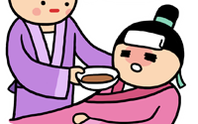In daily life, most people have experience with medication. During the medication process, in addition to using the correct medicine for the symptoms, attention should also be paid to the method of taking the medicine to improve clinical efficacy and reduce adverse reactions.
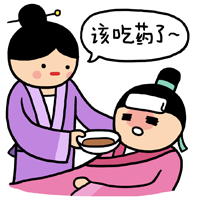
Among traditional Chinese medicine (TCM) formulations, decoctions are widely used due to their rapid absorption, quick onset of action, and the ability to adjust the herbs based on the diagnosis, making them extremely flexible. This aligns with the TCM principle of treating according to the syndrome differentiation, thus becoming one of the most commonly used forms in TCM treatment, widely accepted by patients. However, unlike Western medicine preparations that come with instructions for use, there is no relatively fixed guidance for taking Chinese herbal decoctions, and the method of taking these decoctions can directly affect their efficacy. Generally, a decoction is taken once daily, divided into two doses in the morning and evening, with the frequency adjusted according to the condition.
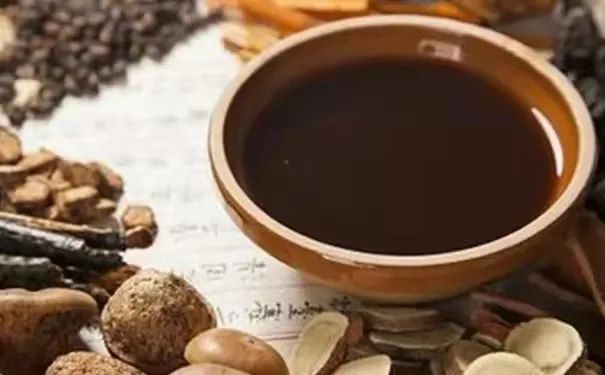
Famous Qing Dynasty physician Xu Lingtai stated in his work “Medical Source Theory”: “The recovery from illness is not only dependent on the prescription but also on the method of taking the medicine. If the prescription is correct but the method of taking it is wrong, it will not only be ineffective but may also be harmful; this is something that must be understood.” Therefore, the correct method of taking Chinese herbal decoctions should be given sufficient attention. So, when and how should Chinese herbal decoctions be taken for the best effect?
1
Reference Times for Taking Chinese Herbal Decoctions
According to the “Shennong’s Classic of Materia Medica”: “For diseases above the chest, take food first and then the medicine; for diseases below the heart and abdomen, take the medicine first and then food; for diseases in the limbs and blood vessels, take on an empty stomach in the morning; for diseases in the bone marrow, take after a full meal at night.” This indicates that the timing of taking medicine varies according to the location of the disease, such as before meals, after meals, in the morning, or before bed.
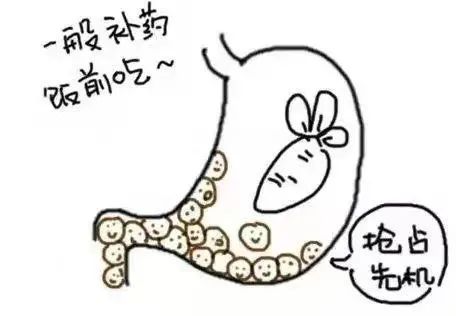
1
Before Meals
Taking medicine on an empty stomach allows the medicine to avoid mixing with food, enabling it to quickly enter the intestines and exert its effects. This is suitable for tonifying herbs, anti-parasitic herbs, purgatives, antacids, and some medications for gastrointestinal diseases. Since taking medicine before meals is beneficial for digestion and absorption, most medicines should be taken before meals, especially for conditions located below, such as liver and kidney deficiency or diseases below the waist, and intestinal diseases, which should be taken before meals for better absorption and efficacy.
2
After Meals
Taking medicine after meals, when there is more food in the stomach, can reduce irritation to the stomach. Therefore, medications that irritate the gastrointestinal tract should be taken after meals, such as digestive aids and anti-rheumatic drugs. Additionally, stomach tonics should also be taken after meals to maximize their effects. Especially for conditions located above, such as heart, lung, and chest diseases, medications that irritate the digestive tract should be taken after meals to allow the medicinal properties to rise; highly toxic medications should also be taken after meals to prevent rapid absorption that could lead to toxicity.
It is important to note that whether taking medicine before or after meals, there should be a slight interval of about one hour to avoid affecting the digestion and absorption of both food and medicine.
3
Between Meals
This refers to taking medicine between two meals to avoid the influence of food on the medicine, which is suitable for treating spleen and stomach diseases.
4
On an Empty Stomach
For tonifying decoctions, it is advisable to take them on an empty stomach in the morning for better absorption.
5
Single Dose
In urgent cases, a single dose may be taken at once. Strongly effective small doses of decoctions can also be taken all at once. This should be done to concentrate the medicinal power without harming the vital energy, maximizing its effects, such as for laxatives or blood-activating herbs.
6
Every Four Hours
For severe or acute illnesses, medicine may be taken every four hours to maintain the efficacy.
7
Frequent Doses
For throat diseases or vomiting, frequent doses should be taken, sipped slowly to ensure the decoction fully contacts the affected area for quicker results.
8
Before Bed
For sleep-inducing and sedative medications, they should be taken one hour before sleep.
9
Overnight Doses
Anti-parasitic medications should be taken once before bed and again on an empty stomach the next morning to more effectively kill and expel parasites from the intestines. (Currently, the use of Chinese medicine for deworming is rare, as Western medicine is more convenient and effective.)
10
Before Disease Onset
a. Medications for asthma and anti-malarial drugs should generally be taken two to three hours before an expected attack, so they take effect just as the disease begins.
b. Medications for menstrual irregularities, especially for dysmenorrhea, should be taken three to seven days before menstruation to regulate the cycle.
11
For Critical Patients
Patients who are comatose, have tetanus, or cannot eat should be given medication via nasogastric feeding. Patients with vomiting can take ginger juice before taking the medicine, and anti-wind and dampness medications can also be taken with yellow wine.
12
Seasonal Considerations for Taking Medicine
Many diseases are seasonal and should be treated with Chinese medicine promptly during the season of onset. However, attention should be paid to the issue of taking medicine at opposite times of the season, such as treating winter diseases in summer and summer diseases in winter. The reason is that some diseases, if treated during their season of onset, may not be completely eradicated. Intentional care during the off-season can facilitate recovery. For example, coughs that are more prevalent in winter, often due to phlegm and dampness, may become more pronounced in cold weather. However, at this time, the condition is more severe, requiring TCM’s approach of “treating the symptoms urgently” to temporarily alleviate the disease. If one consciously takes phlegm-drying and dampness-expelling herbs in summer, along with appropriate care, it can reduce the chances of winter onset. Even if an attack occurs, the condition will not be too severe, allowing for a comprehensive treatment approach to eliminate the stubborn disease.
2
Reference Temperatures for Taking Chinese Herbal Decoctions
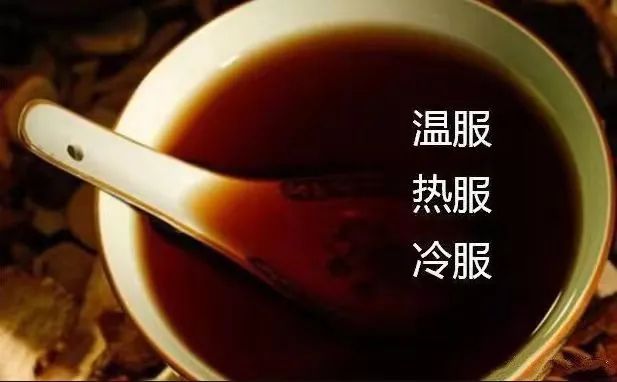
1
Cool Consumption
Taking the decoction after it has cooled or taking Chinese patent medicines with cool boiled water is referred to as cool consumption. Cold medicines should be taken cool, following the principle of “cooling the hot”. True cold and false heat should use hot medicines, which should also be taken cool, following the principle of “hot medicines taken cool”. Generally, hemostatic, astringent, heat-clearing, detoxifying, and summer-heat relieving medicines should be taken cool. If vomiting occurs after taking medicine, one should first take a small amount of ginger juice or chew a bit of dried tangerine peel before taking it cool to alleviate symptoms.
2
Warm Consumption
Neutral and tonifying medicines should be taken warm at around 35°C to enhance energy and nourishment. Generally, most Chinese medicines are taken warm. Cold (cool) substances belong to yin, and excessive yin can damage yang. The spleen and stomach qi belong to yang, and when the patient’s spleen and stomach qi is weak, taking cool decoctions will further harm the yang qi, which is detrimental to the condition. Warm consumption can also reduce some adverse reactions of certain medicines, such as those that irritate the gastrointestinal tract, like Trichosanthes fruit (gua lou), frankincense (ru xiang), and myrrh (mo yao), which can cause nausea and vomiting. Taking them warm can alleviate these adverse reactions, and warming herbs can also be taken with ginger soup. It is important to note that if the decoction has cooled, it should be reheated to boiling to dissolve any precipitated effective components before being allowed to cool for consumption. It is not advisable to simply heat it to a warm temperature without cooling, as many effective components may precipitate out due to low solubility. If only the clear liquid on top is consumed, the therapeutic effect will be compromised. Heating to boiling allows the precipitated effective components to dissolve again, and after cooling, it can be consumed, which is essentially similar to the effect of freshly brewed decoction.
3
Hot Consumption
Taking the decoction while it is still hot or taking Chinese patent medicines with hot boiled water is referred to as hot consumption. Exterior-releasing medicines must be taken hot to assist in inducing sweating. Cold conditions should use hot medicines, following the principle of “heating the cold”. True heat and false cold should use cold medicines, which should also be taken hot, following the principle of “cold medicines taken hot” to reduce patient resistance to taking the medicine. It is also necessary to apply heat externally. Whether it is decoctions or patent medicines, all qi-regulating, blood-activating, stasis-resolving, and tonifying agents should be taken hot.
Author’s Biography

Traditional Chinese Medicine
Expert
Biography
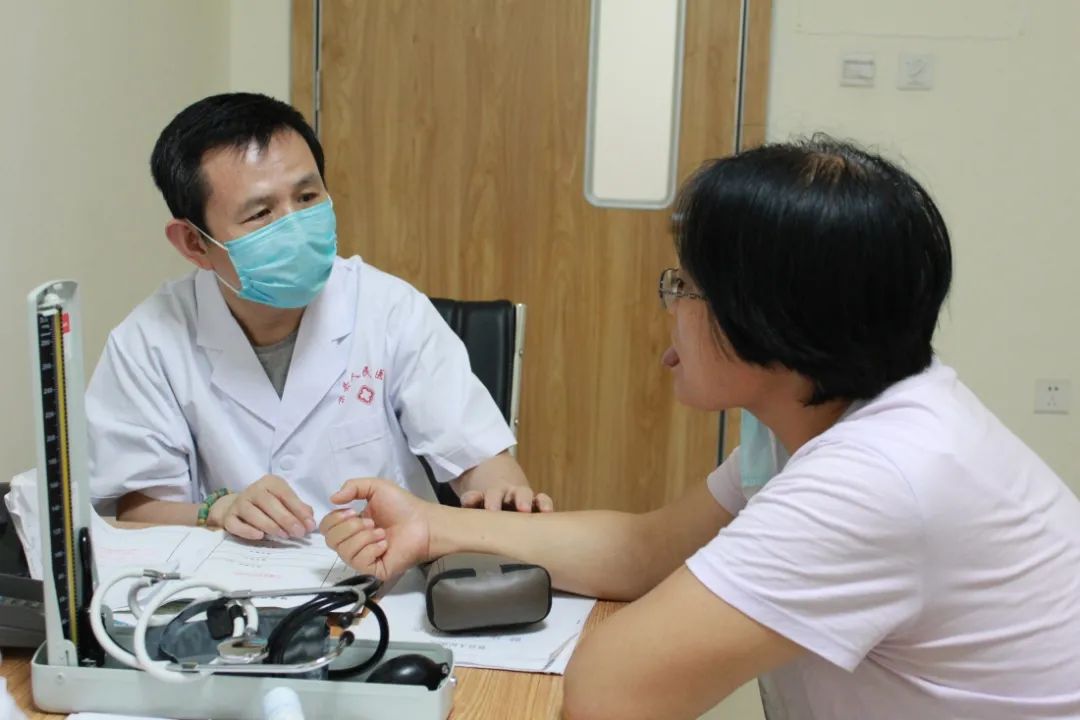
Li Xue, Chief Physician, Master of Medicine, Professor, former Director of the Hepatology Center at the Hebei Provincial Hospital of the Armed Police Force, senior expert at the military level, recipient of the military’s third-class outstanding technical talent allowance, and has been awarded third-class merit three times.
National Committee Member of the National Critical and Difficult Liver Disease Research Cooperation Group, one of the first national experts in liver and gallbladder disease popular science consultation, Vice Chairman of the Liver Disease Branch of the Chinese Association of Traditional Chinese Medicine, Director of the Chinese Society of Immunology, Member of the Expert Committee on Hepatology of the Chinese Medical Association, Standing Committee Member of the Liver Drug Research Committee of the Chinese Herbal Medicine Association, Director of the Infectious Disease Branch of the Chinese Ethnic Medicine Association, Member of the Liver Disease Branch of the Chinese Association of Traditional Chinese Medicine, Executive Director of the Hebei Provincial Alliance for Hepatology Diagnosis and Treatment Technology, and Standing Committee Member of the “Youan Hepatitis Infection Disease Specialty Medical Alliance”.
Specialization:
Engaged in the integration of traditional Chinese and Western medicine for infectious diseases and hepatobiliary diseases for 35 years, specializing in the combined diagnosis and treatment of hepatobiliary and digestive diseases, as well as infectious diseases.
Consultation Hours:
Every Sunday and Monday from 8:00 AM to 11:50 AM, and 2:30 PM to 5:00 PM
Consultation Location:
North Side of the Expert Clinic, East Corridor, 2nd Floor

Appointment Phone (During Working Hours)
0318-6119798

Appointment WeChat




